- Home
- Libba Bray
Lair of Dreams Page 5
Lair of Dreams Read online
Page 5
“Louis!” Henry called, running for the building.
“Wait!” the girl called, startling.
A woman’s shriek pierced the dream: “Murder! Murder! Oh, murder!” Something was moving in the fog, coming closer.
A church bell tolled, growing louder and louder. Suddenly, the distant roofs of Chinatown, the impressionistic streets of the old city, the limestone building—all of it curled up as if the dream been thrown into the fire.
“No! Not yet!” Henry cried, but it was too late. The last thing he saw was the girl dream walker’s bright green eyes, and then he woke to the clang of his alarm clock as it tumbled from the windowsill and landed on the floor with a clatter. On the table, the metronome ticked away. His watch showed one minute till four. He’d been under for fifty-nine minutes.
“Horsefeathers, Henry!” Theta marched into the room with her sleep mask pushed up over her short dark bangs and shut off the alarm.
“S-sorry, Theta.”
Sighing, Theta silenced the metronome. “You went looking again?”
“Theta, I think I found him.”
“You did? Oh, Hen!” Theta covered the shivering Henry with a blanket and pulled a chair for herself next to his. “Go on. Spill.”
Henry told Theta about hearing Louis’s fiddle. “Maybe he’s trying to find me, too.”
“Gee, that’s swell news. Hen,” Theta said, sounding worried, “can you move yet?”
For at least five minutes after a dream walk, Henry remained paralyzed, as if his body were still in that other world. With effort, he lifted his arm a fraction, wincing as he worked movement back into the muscles. “See? Good as new.”
“You know it scares me when you do this. What if one time you can’t move? What if you don’t come back?”
“Don’t worry, darlin’. I don’t overdo it.”
“Only one night a week,” Theta reminded him. “Only for an hour.”
“Yes, ma’am,” Henry said. “I haven’t even told you the strangest part: I wasn’t the only one walking around tonight.”
“There’s somebody else like you?”
“Yes! A girl. When she showed up, I heard the song. Maybe she knows something about Louis. Maybe she can help me find him, Theta.”
“Well, did you get anything from her? A name?”
“No,” Henry said mournfully. “But it’s the first bit of luck I’ve had.”
“We’d better get some sleep or we’ll be dragging through rehearsal tomorrow.”
Henry rolled his eyes. “Florenz Ziegfeld presents: Hocus-Pocus Hotcha! An all-new Diviners revue filled with magic and mysticism in song and dance!”
“So it’s a lousy show. We’ll make it better. It’s the one that’s gonna take us to the top, kid.”
“Take you to the top, you mean. You’re the one Flo’s grooming to be a star.”
“We’re a team. You take one, you gotta take the other.”
“Who’s my best girl?” Henry asked.
“I am. And don’t you forget it.”
Theta let out a long sigh and snuggled next to her best friend, resting her head on his chest. Her sleek dark bob still smelled like cigarette smoke. “Maybe we’re all going crazy.”
“Maybe.” Henry kissed the top of Theta’s head, and she put her arm across his stomach.
“Hen?”
“Yeah, darlin’?”
“Can I sleep in your bed with you?”
“If you can get me there.”
Theta helped Henry to his feet and then to his room, where the two of them fell asleep side by side, arms entwined like two halves of the same whole.
In his dream, George Huang stood under the hazy sun at a late-afternoon party wearing a cream-colored suit and a striped silk shirt with fancy French cuffs of the sort he’d stared at in shop windows where they didn’t welcome people like him. The bright, fast rhythms of a jazz band echoed through the dream. Up on the hill, a sprawling white house loomed, casting sharp blades of shadow across the summer-green lawn.
George smiled, ecstatic. His good dream! Somehow, he’d made it back here.
Men nodded solemnly as George walked by. He was important here. Respected. Photographers took his picture for the papers. As George smiled and posed, he saw the boys who’d bullied him and the customers who ordered him around as if he were barely human huddled together on the other side of a tall picket fence, watching, envying. George raised his champagne glass. How do you like me now? he thought.
“Georgie! Over here! Hey!” Several pretty girls waved to him as they peeled off their stockings and jumped into a champagne fountain, giggling and splashing with abandon. George threw his head back and laughed. Oh, this was the best dream in the world! He never wanted to wake up.
On the edge of the lawn, Lee Fan appeared wearing a red cheongsam, the wind whipping her hair across her rouged cheeks.
“Dream with me…” she whispered. She turned and walked inside the tall white house.
That whisper ignited a new fire in George. He’d never wanted anyone or anything so desperately. His ancestors shimmered on the edges of the party like images fading from a photograph. Some of them seemed to be reaching out, as if they could grab hold of him, as if they wanted to tell him something important, but George didn’t want to lose sight of his dream. So he raced ahead, leaving them behind. He ran past the fountain, where the dripping girls eyed him hungrily. Their voices swirled, a seductive, whispering chorus: “Dream with us, dream with us, us, us, the dream wants you wants you wants you to dream to dream to dream with us.”
Lee Fan stood just inside the darkened doorway of the house in her red dress. She waved her arm, and behind her the dark lit up like a movie screen, showing a film in which the two of them danced close while an orchestra played and a girl singer crooned, “Beautiful dreamer, wake unto me. Starlight and dewdrops are waiting for thee.…”
On-screen, Lee Fan angled her face toward George’s for a kiss, and his heart fluttered. But just before the actual kiss, it all went dark again, like a nickelodeon cutting out at the good part so you’d keep putting in nickels. In the doorway, Lee Fan crooked a finger, beckoning George as she backed in, letting the gloom swallow her whole. Everything George wanted was waiting there in the dark, so he went inside.
Above him, the ceiling winked with a soft phosphorescence. The shivery coolness was an unwelcome surprise, though. And there were sounds—low growls and scratchings that gave him pause. He glanced back through the open door at the sliver of sunshine he’d left behind, then pressed on, walking deeper into darkness.
“Lee Fan?” he called.
No answer.
Shadows moved across George’s hands, and he looked up toward the flickering ceiling.
No, not flickering.
Moving.
The low growls he’d heard swelled into a bone-chilling chorus, and George had only one thought: Wake up NOW. He ran back toward the hazy circle of daylight. Back to where everything was good. But every time he got close, the sunlight drew farther away.
At last, George pushed free, tumbling down onto the lawn. The summer grass had gone brittle; it twisted with snakes. The champagne fountain ran red with blood. The half-dressed girls slurped up handfuls of the stuff, and when they opened their rotting mouths, they had teeth as sharp as a razor’s edge. “More!” they cried. “More!”
“Promise…” the dream demanded.
“Wake up. Wake up wake up wake up,” George whispered to himself. He shut his eyes, but it didn’t matter; the dream pushed further and further into his mind until his head was filled with the most terrible images: demons eating his entrails, tearing at his neck with their teeth. He couldn’t take another second.
“I promise!” he cried, opening his eyes again.
There was a sharp prick of pain, then an icy cold spreading through him. Far off, Lee Fan waved to him. He could not reach her. He would never reach her.
His lips opened to let out one last cry for help.
 
; But it never came.
The dull gray morning parceled out a meager portion of winter sun to the immigrant neighborhoods of Manhattan’s Lower East Side. Merchants rolled up window shades for another day of business. Tailors who’d escaped pogroms in the Pale readied their sewing machines on Ludlow and Hester Streets while steam rose from the basement grates of the Chinese-run laundries lining Pell and Bayard. The Italian bakeries on Mulberry Street stocked their front windows with golden loaves of bread; the yeast scented the winter air, mixing with the savory tang of chow fan, the tart brine from the pickle barrels, and the cinnamon sweetness of rugelach, a true melting pot of smells. Wind whipped over synagogues, churches, and temples and clanged through the zigzag of metal fire escapes, but it was no competition for the rumble and squeal of the Third Avenue El on the Bowery, the towering dividing line between the Lower East Side and the rest of New York City.
From her bed, Ling peered out at the gray-wool clouds threatening to muzzle the paltry sun above Chinatown and made a growl of contempt low in her throat, as if the winter sky were out to get her personally. Fiery spasms rippled across the nerve endings of her legs, and Ling bit down against the pain just as her mother’s voice sounded on the other side of the door: “Rise and shine, Ling!”
Her mother poked her freckled face in, frowning. “You’re not even dressed, my girl. What’s the matter? Are you feeling all right?”
“I’m fine, Mama,” Ling managed to say.
“Here. Let me help you.”
“I can do it,” Ling said, trying to conceal both her pain and her irritation.
Her mother hovered in the doorway. “I laid out your slip and dress for you last night. And the wool stockings—it’s terrible cold out.”
Ling flicked her eyes toward the end of the bed. Her mother had chosen the peach dress Ling hated, the one that made her look like a sad fruit salad. “Thank you, Mama.”
“Well,” her mother said at last, “don’t dally. Breakfast will get cold, and I won’t be hearing a word about that.”
Only when the door had closed did Ling let out the grunt she’d held back as the tightness loosened its grip on her legs. She lay in bed a moment longer, mulling over last night’s strange dream walk. She’d never met anyone else who could do what she could, which was how she liked it. Her nighttime wanderings were private. Sacred. But that spark…
Ling sat up. With a sigh, she reached for the metal braces propped against her nightstand and slid them on over the useless muscles of her calves, cinching the buckles of the leather straps just below and above her knees. Using both hands, she swung her caged legs over the side of the bed, grabbed her crutches, and shuffled stiffly to her cupboard, tugging on a dark blue dress that didn’t make her feel as if she were an item on a summer picnic table. She tied the laces on her black orthopedic shoes. In the mirror, Ling took a last look at herself. What she saw was metal, buckles, and ugly black shoes.
“Ling!” Her mother’s voice again.
“Coming, Mama!”
She squinted at her reflection until she was nothing but a blue blur.
In the dining room, the radio played a Sunday-morning program of hymns while her mother poured tea into delicate china cups. Ling took her silent place at the table beside her father and examined the spread before her: fried eggs, bacon, noodles with pork fat, shrimp dumplings, porridge, and toast. The eggs, she knew, would be slightly slimy—her father was the real cook, not her mother—and the porridge was out of the question, so she settled for the toast.
“That isn’t all you mean to eat,” her mother said with a tsk.
Her father maneuvered a dumpling onto Ling’s plate. Ling scowled at it.
“You’ve got to keep your strength up, my girl,” her mother said.
“Your mother is right,” her father agreed automatically.
Ling turned toward her great-uncle. He was the eldest; his opinion mattered most.
“If she wants to eat, she’ll eat,” he said, smiling at her, and Ling could’ve hugged him.
If she’d been the hugging sort.
“At least have some tea.” Ling’s mother placed the steaming cup down at Ling’s plate. She poured tea for Ling’s father, too, and laid a comforting hand on his shoulder. Mr. Chan smiled up at his wife. Twenty years ago, when both of them had newly emigrated—her father from China and her mother from Ireland—her parents had met at a church social. They’d married six months later, and sometimes they still looked at each other like shy, smitten kids at their first dance. Ling found it hideously embarrassing, so she angled her head away from them and toward the newspaper tucked against her father’s plate. An article bore the headline JAKE MARLOWE ANNOUNCES FUTURE OF AMERICA EXHIBITION.
“It might be easier to read this way,” her father said. He smiled as he handed the newspaper to her.
“Thank you, Baba.”
“Read while you eat,” her mother pleaded. “Or we’ll be late for Mass.”
Ling nibbled a corner of her toast as she skimmed the article:
Jake Marlowe to break ground in Queens, New York, for his Future of America Exhibition. Celebrating “The Brave New Age of the Exceptional American,” the fair will highlight America’s best and brightest, showcasing achievements and advances in the sciences, agriculture, mathematics, eugenics, robotics, aviation, and medicine.
“I suppose you’ll want to go,” her father said, his eyes twinkling.
Ling knew it was a long shot. Life in the restaurant was all-consuming. For her parents to drive her out to Queens for the groundbreaking ceremony would be precious time away.
“Could I, Baba?”
“We’ll see what we can do.”
Ling gave a half smile. Another, smaller headline caught her attention, and the smile was replaced by a frown.
MYSTERIOUS SLEEPING SICKNESS BAFFLES HEALTH OFFICIALS
The sleeping sickness that has bedeviled the residents of Chinatown is now the scourge of other New York City neighborhoods. Four new cases have been reported on the Lower East Side, and one case has been documented as far north as Fourteenth Street. Health officials who remember all too well the devastation of the Spanish Influenza Pandemic in 1918 assure the public that they are investigating with rigor and will ensure the safety of all New Yorkers.
“I heard there’s a new case on Mulberry, an Italian girl. And possibly another on Hester Street,” Uncle Eddie said. “You know they’re calling it the Chinese Sleeping Sickness.”
Ling’s father continued sipping his coffee, but she could see from the set of his jaw that the illness’s name registered.
“But this sleeping sickness isn’t just here in Chinatown,” Mrs. Chan said, wiping her pink, freckled hands on her apron.
“All it takes is someone to say it started here and we’re to blame. I hear the city might even cancel our New Year’s celebrations,” Uncle Eddie said.
“Baba, would they really?” Ling asked. The Year of the Rabbit was only a few weeks away.
“Don’t worry. The Association will make certain the celebrations go on as planned,” Ling’s father said.
“Not if they don’t stop this sickness soon.” Uncle Eddie sighed. “Already business is down. Fewer tourists come every day.”
“It will be fine,” Mr. Chan said.
Uncle Eddie shook his head and turned to Ling. “Your father. Ever the optimist.”
“And what’s the matter with that?” Mrs. Chan tutted.
“If you believe it, it will be,” Mr. Chan said. “If you do not…”
“It will not,” Ling finished. She bit down as another spasm gripped her left leg.
“Ling! Are you all right?”
“Yes, Mama,” Ling managed to say.
“Perhaps you oughtn’t go to Mass this morning.”
“I’m fine,” Ling said. It wasn’t so much that she wanted to go to church as it was that she was desperate to get out of the house. If her mother thought the spasms weren’t improving, she’d make her stay in bed. Lin
g felt guilty enough that she wasn’t pulling her weight at the restaurant, and Sunday was the busiest day of the week at the Tea House.
Her mother sighed. “All right, my stubborn lass. I can’t fight you on everything. Put your coat on.”
Church bells sang a Sunday-morning city hymn as Ling and her parents strolled past the pushcart vendors, the greengrocers, and the fish sellers setting up for another day. The occasional automobile honked its way up the narrow street, threading around people dressed in their Sunday best and people dressed for work. As they walked, Ling’s mother nodded and smiled and chatted with neighbors who averted their eyes at the sight of Ling’s braces, as if she only existed from the waist up, as if they could catch the bad luck of her illness simply by looking. Ling would have to force a smile and feign interest in what was being said while thinking, If only I were asleep. If only I were dreaming. Everyone fell silent as they passed an apartment building where a yellow sign had been pasted across the front doors: CITY OF NEW YORK DEPARTMENT OF HEALTH. THESE PREMISES ARE UNDER STATE QUARANTINE REGULATIONS. SLEEPING SICKNESS: KEEP OUT.
The streets of Chinatown seemed charged, the scent of iron before the storm.
The doors to the quarantined building opened. Masked members of the Chinese Benevolent Association dragged infected bedding into a nearby alley, where other men waited with pails of water. They set the bedding alight. Everyone stopped to watch it burn. The wind blew soot into Ling’s eyes. She turned her head away from the flames and gritty air and, for a second, she saw George, chalk-pale, without a coat, standing just beyond the crowd on the edge of Columbus Park. Ling rubbed at her tearing eyes, and when she opened them again, there was no sign of George anywhere.
“It’s terrible, isn’t it?” Lee Fan had sidled up next to Ling. They watched as the men in masks doused the fire with the pails of water.
“Yes,” Ling said, trying not to cough at the acrid air.

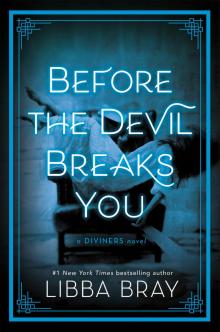 Before the Devil Breaks You
Before the Devil Breaks You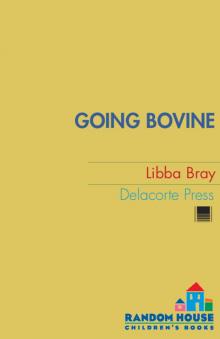 Going Bovine
Going Bovine A Great and Terrible Beauty
A Great and Terrible Beauty Rebel Angels
Rebel Angels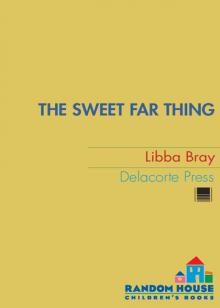 The Sweet Far Thing
The Sweet Far Thing Vacations From Hell
Vacations From Hell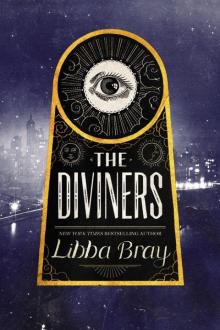 The Diviners
The Diviners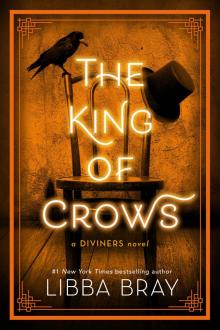 The King of Crows
The King of Crows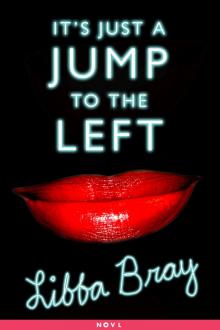 It's Just a Jump to the Left
It's Just a Jump to the Left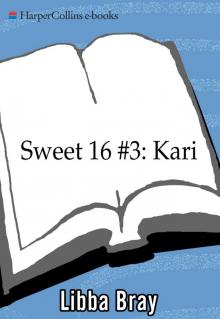 Kari
Kari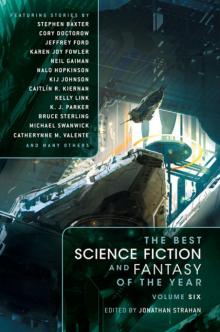 The Best Science Fiction and Fantasy of the Year Volume 6
The Best Science Fiction and Fantasy of the Year Volume 6